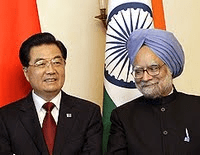After a year of turmoil in Sino-Indian relations, India hosted Chinese Premier Wen Jiabao last week with a degree of fanfare. Wen's visit came at a time of newfound assertiveness in India's China policy. Having tried to brush significant divergences with Beijing under the carpet for years, New Delhi policymakers have been forced to acknowledge -- if grudgingly so -- that the relationship with China has become increasingly contentious. Indian Prime Minister Manmohan Singh suggested just a few weeks ago that "China would like to have a foothold in South Asia and we have to reflect on this reality. . . . It's important to be prepared." India has also adopted a harder line on Tibet in recent weeks, making it clear that it expects China to reciprocate on Jammu and Kashmir. In the past, India has respected Chinese sensitivities on Tibet and Taiwan.
Ignoring pressures from Beijing, India also decided to take part in the Nobel Peace Prize ceremony for the Chinese dissident Liu Xiaobo in Oslo. Beijing asked several countries, including India, to boycott the ceremony or risk facing its displeasure, describing the prize as open support for criminal activities in China. India was among the 44 states that did decide to participate, while Pakistan, Russia, Saudi Arabia, Iran and Iraq were among those that did not attend. There were even rumors that Wen might cancel his India trip in response, but they proved unfounded.
India had flagged a number of concerns before the visit. The most significant involve issues impinging on India's sovereignty, such as the Chinese presence in Pakistan-occupied Kashmir and Beijing's issuance of stapled visas to Indians entering China from Jammu and Kashmir. India had also expressed its concerns about the upstream dams Beijing is building on shared rivers, like the Brahmaputra, and the trade barriers Indian companies face in China. India is keen on gaining access to Chinese markets, especially in the area of pharmaceuticals, information technology and engineering goods, sectors in which India argues its companies face non-tariff barriers in China.

